China opens wider to boost foreign investment
2017-07-28
english.gov.cn
China is striving to become more inviting to FDI and foreign talent by widening market access and bettering the business environment.
The decision was made at a State Council executive meeting presided over by Premier Li Keqiang on July 28.
The negative list-based market access regime for foreign capital, already in trials in the country’s 11 free trade zones, will be rolled out nationwide as soon as possible, and more sectors will be more open for FDI. Profits at foreign-invested companies will be guaranteed free flow out of China.
To make China more appealing to foreign talent, the government will put in place a work permit system for foreigners working in China, with detailed guidelines for visa application and evaluation benchmarks for widened access to foreign talent to be developed in the second half of this year. Five- to 10-year multiple entry visas will be issued to qualified expatriates, who can apply for work permits and work-related residential certificates accordingly.
“The inflow of foreign capital has been pivotal for China to maintain a relatively quick growth rate. Our industries are in general at the lower end of the global value chain. We must send a strong message of welcome to foreign investment,” Premier Li said.
Inbound FDI fell by 0.1 percent year-on-year to 441.54 billion yuan ($65.5 billion) in the first half of this year, but the number of newly launched foreign enterprises in China was up by 12.3 percent, according to the Ministry of Commerce. In a sign of stabilizing FDI, the inflow rose by 2.3 percent in June year-on-year, to 100.45 billion yuan.
A report released by the American Chamber of Commerce Shanghai earlier this month showed that about 77 percent of US companies in China surveyed are making profits, with 73.5 percent of companies reporting revenue growth in 2016.
Tax deferral will be extended to foreign investors if their local profits are invested in preferential fields. It will also promote the integration between FDI and outbound investment and encourage multinationals to set up regional headquarters in China.
The flow of FDI to the country’s western and northeastern regions will receive extra support.
Premier Li highlighted the need to develop a business environment that is more in line with international practices and the rule of law.
“We must make sure the policies cutting fees and taxes are fully implemented. Government supervision should be in the form of standardized random checks, which is more of an international practice and more effective,” he said.
The Chinese government will increase the interconnectivity of information systems between different departments, and pilot single window and single form registry for foreign enterprises in the filing of records and business registration process.
The State will also improve the legal system in relation to foreign investment. Foreign capital will be encouraged in the restructuring of domestic enterprises, and intellectual property rights of foreign enterprises will be better protected.
The government will also improve the competitiveness of the country’s research and development environment, and ensure the stability and consistency of policies regarding foreign capital.
“Government departments should develop action plans as soon as possible, and put these into quick action, continuously making China the height in opening-up and investment,” Premier Li said.

